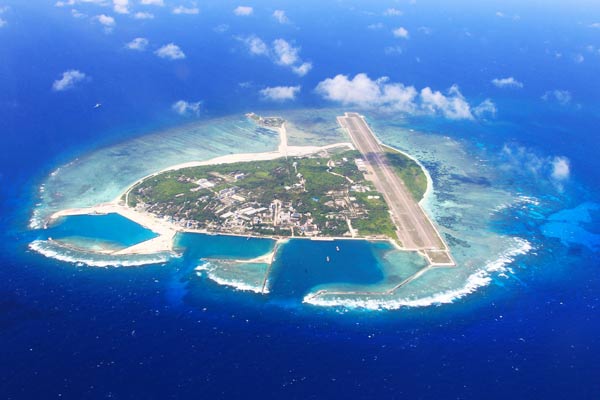
An aerial view of Yongxing Island, home to the government of Sansha, China's southernmost city. [Photo/Xinhua]
By Zhao Lei
Resolution sought after agency moved under Armed Police Force (APF)
National lawmakers on Friday passed a resolution specifying the authority and responsibilities of the newly reshuffled China Coast Guard.
The resolution, which serves as the legal basis for the Coast Guard, makes it clear that the force is tasked with cracking down on illegal activities at sea, safeguarding security and order of maritime operations, protecting the marine environment and ecosystems, regulating the fishing industry, and coordinating and training local governments' maritime law enforcement.
It also lists responsibilities mentioned in current laws that now belong to multiple government departments but will be assigned to the Coast Guard.
The resolution was adopted at the bimonthly session of the Standing Committee of the National People's Congress, the top legislature.
General Wang Ning, commander of the Armed Police Force, said that existing rules on the Coast Guard's powers and responsibilities have become outdated. They need to be modified for the force to carry out maritime law enforcement operations with the move from the former State Oceanic Administration to the Armed Police Force, he said.
The Coast Guard now has new command systems, operational mechanisms and coordination patterns, he said, while briefing the legislators about the draft resolution on Tuesday.
In addition, some clauses in current laws and regulations pertaining to the Coast Guard have become inconsistent with the force's new status and missions, so amendments are necessary, he said.
Amending multiple laws, however, usually takes a long time. Timely passage of a specific resolution on the Coast Guard's new authority and responsibilities was needed to grant a legal basis for the new force's operations, Wang said.
The Coast Guard was established in July 2013 as a result of a government reorganization, merging several organs administered by separate government departments that independently conducted law enforcement operations on the sea, such as the maritime police under the public security authorities and anti-smuggling police under the General Administration of Customs.
It was affiliated with the State Oceanic Administration but also took guidance and instructions from the Ministry of Public Security.
In March, the central leadership issued a massive reform plan of many bodies of the Communist Party of China and the central government, which included the transfer of the Coast Guard to the Armed Police Force.
The Coast Guard is now undertaking a host of reform measures arranged by the Communist Party of China Central Committee and the Central Military Commission, Wang said.
The Armed Police Force itself was placed under the unified control of the CPC Central Committee and Central Military Commission as of January.
Under the new command chain, Armed Police units take orders directly from the force's headquarters, which, likewise, follows directives from the Central Military Commission instead of instructions from both the commission and the State Council.
Cao Yin contributed to this story.









